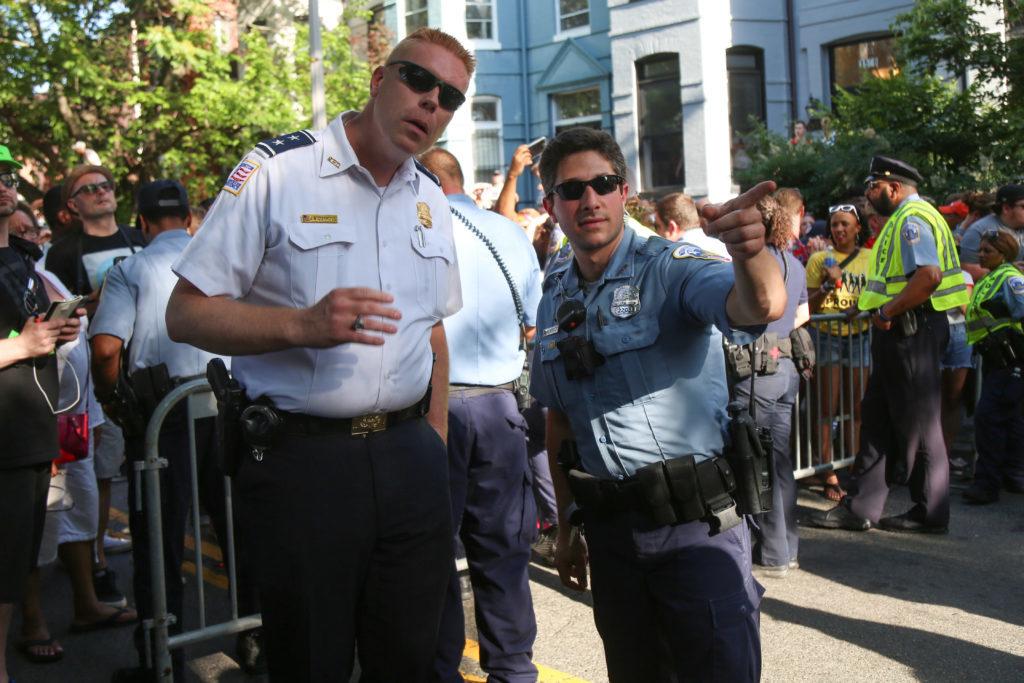In his first year as the permanent police chief of the Metropolitan Police Department, Peter Newsham is seeking to improve relations with the community and job satisfaction among the officers he has served alongside for decades.
In his first interview with the Hatchet as chief, Newsham laid out his vision to take the department in a more progressive direction, prioritizing community policing to strengthen ties between officers and the communities that they patrol and boosting morale to prevent officers from fleeing to other departments.
“I want to let people know when they work for the Metropolitan Police Department they are working for the most progressive agency in the country,” Newsham said in the interview.
Internally, Newsham, who was officially named permanent police chief last month after holding the position on an interim basis since last year, said preparing younger officers to take on leadership roles would encourage them to stay on the force.
The department is facing a potential officer shortage as many approach retirement age, leaving fewer officers to patrol the streets. The department brought on about 1,000 officers during a hiring surge between 1989 and 1990 and many are now eligible to retire after 25 years in the department.
MPD lost about 5 percent of its officers to voluntary and involuntary attrition in 2015, according to the most recent MPD annual report. MPD’s force consisted of 3,737 officers in October – 263 officers short of the number that city officials say is necessary to fully staff the department, according to the most recent MPD data.
“We believe that when you arrest folks that have mental health or substance abuse issues, just arresting them over and over again doesn’t do any good.”
Newsham said boosting officer morale and job satisfaction will prevent an exodus from the department and ensure strong future leadership.
He said MPD has been holding a series of community meetings this year, giving residents a chance to provide input on community policing strategies in the District. The department will release a report based off of residents’ comments next month laying out suggested community policing policies, he said.
Serving as interim chief since September, Newsham reorganized MPD’s operations into sectors to promote closer ties with the community and added additional leaders to improve accountability and give community members more contact points in the department.
The department is exploring a partnership with the D.C. Department of Behavioral Health to help city residents struggling with mental health and substance abuse issues stay out of the criminal justice system if they agree to seek long-term help, he added.
“We believe that when you arrest folks that have mental health or substance abuse issues, just arresting them over and over again doesn’t do any good,” he said.
Rachel Reid, an MPD spokeswoman, said the Law Enforcement Assisted Diversion program, which allows residents with mental health or substance abuse issues to avoid charges if they get treatment in a trauma-informed case-management program, will likely come to D.C. Under the National Support Bureau, the program already operates in cities like Seattle and Baltimore, according to the program’s website.
MPD officials described Newsham as an approachable leader whose long history on the force has given him insight into what officers desire from leadership, helping to fight rising attrition numbers in the department.
In the last few months, officer shifts were adjusted to four 10-hour shifts instead of five eight-hour shifts during the week, a change favored by officers because it allows them to spend more time to spend with family. Uniform requirements were also loosened, giving officer more comfortable uniforms and allowing male officers to grow neatly trimmed facial hair.
Police Sgt. Stephen Bigelow, the vice chairman of the DC Police Union, said the department previously struggled with low morale in its ranks. Officers often did not want to work and would abuse their sick leave, leaving fewer officers to monitor the streets, he said.
Bigelow said the attrition numbers helped push Newsham to prioritize officer morale to keep more officers with the department.
“I think from my experience with Chief Newsham, that has always been near and dear to his heart,” he said. “So I think he would have done it regardless,” he said.
“I think being a police recruiter in addition to working with the community might be one of the most paramount important things that a police chief can do.”
Newsham joined MPD 27 years ago and moved up in the department from commander of the Second District – which includes Foggy Bottom – to assistant chief of the Office of Professional Responsibility. He served for 14 years as an assistant chief overseeing various offices and bureaus.
Experts said MPD’s current focus on connecting with the community and keeping the officer count up falls in line with the priorities of law enforcement departments across the country.
Craig Miller, the chief of police for the Dallas Independent School District Police Department and former deputy chief with the Dallas Police Department, said nationally, chiefs are recruiting more officers as departments across the country struggle with staff shortages, especially urban departments that have to compete with less rigorous jobs in suburban departments.
“I think being a police recruiter in addition to working with the community might be one of the most paramount important things that a police chief can do,” he said.





